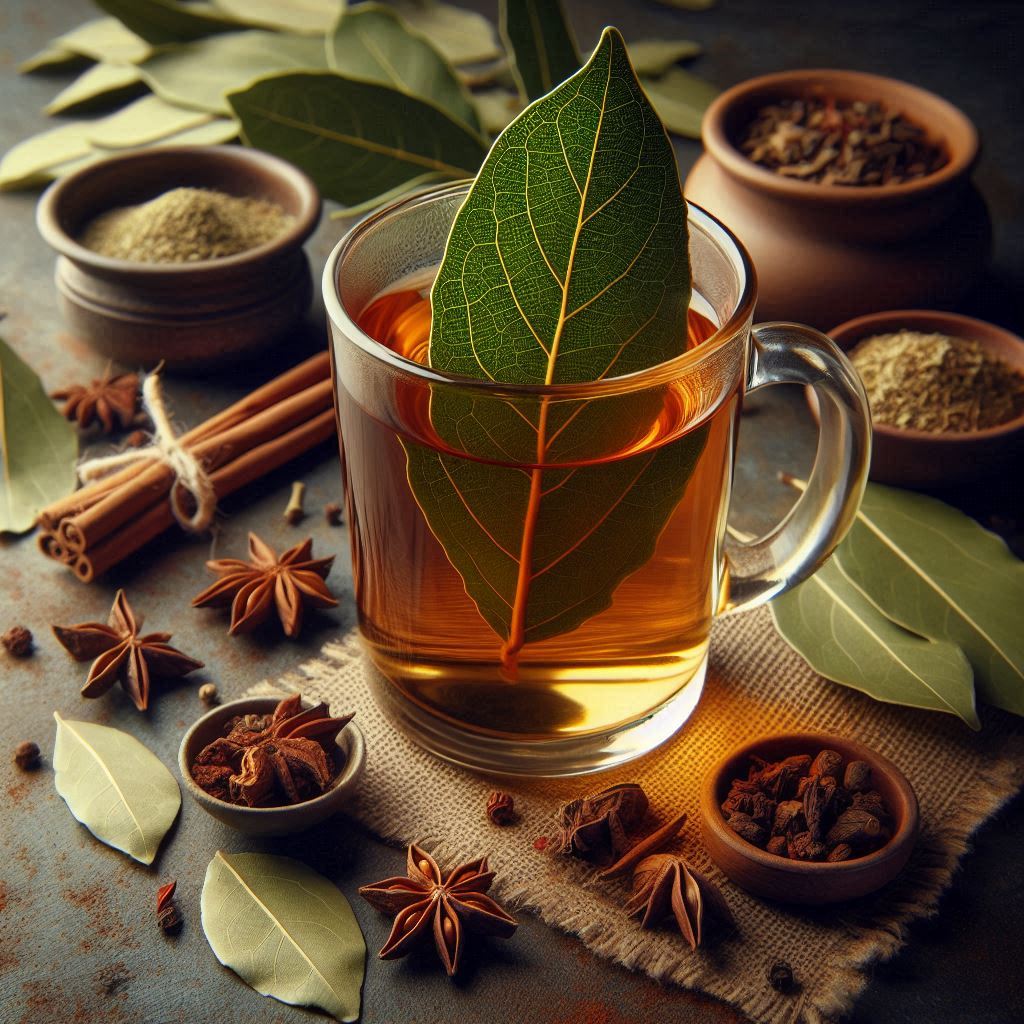
Bay Leaf Wonders: How This Indian Spice Boosts Health and Flavor
When it comes to herbs and spices, bay leaves often take a backseat, overshadowed by more prominent flavors like turmeric, cinnamon, or ginger. But don’t let their unassuming nature fool you—bay leaves pack a punch in both flavor and health benefits. Widely used in Indian, Mediterranean, and even European cuisines, bay leaves add a subtle depth of flavor to dishes. This aromatic leaf is more than a cooking staple; it is a powerhouse of nutrients with surprising health benefits.

Here’s an in-depth look at how bay leaves can boost your health and enhance your diet.
The Nutritional Profile of Bay Leaves
Although they’re primarily used as a flavor enhancer, bay leaves bring essential nutrients to your meal. Rich in vitamins like A, C, and B6, and minerals like calcium, iron, magnesium, and potassium, bay leaves add a subtle nutritional boost. Here’s a closer look at what makes them so special, and why you should care:
- Vitamin A: Essential for eye health and immune function, helping fight off infections and maintain clear vision.
- Vitamin C: A powerful antioxidant that supports immunity, skin health, and faster wound healing.
- Iron and Calcium: While typically used in small amounts, the minerals in bay leaves can help support bone health and red blood cell production when included as part of a balanced diet.
Health Benefits of Bay Leaves
- Aids Digestion Bay leaves have long been celebrated in traditional medicine for their positive effects on digestion. They help stimulate digestion by enhancing the secretion of digestive enzymes. The compounds in bay leaves, such as eugenol, can reduce bloating, indigestion, and gas, making them a valuable addition for those with gastrointestinal discomfort. Including bay leaves in your diet can help support overall digestive health.
- Supports Heart Health The potassium and magnesium in bay leaves play essential roles in maintaining cardiovascular health. Potassium helps regulate blood pressure by balancing sodium levels in the body, while magnesium helps relax blood vessels, promoting better blood circulation. Eugenol, an antioxidant found in bay leaves, also helps prevent oxidative damage to the heart. This makes bay leaves an excellent choice for those looking to support their heart health naturally.
- Boosts Immunity Rich in vitamin C and other antioxidants, bay leaves help boost the immune system. Vitamin C helps white blood cells function more effectively, strengthening the body’s defenses against infections and viruses. The plant compounds in bay leaves, such as polyphenols, also have anti-inflammatory and antimicrobial properties, offering additional immune support.
- Anti-Inflammatory Benefits Bay leaves contain eugenol and other essential oils that have been studied for their anti-inflammatory effects. For those with inflammatory conditions like arthritis, bay leaves may help reduce pain and inflammation. Incorporating bay leaves in soups, stews, and teas can provide gentle anti-inflammatory support, especially beneficial for those on an anti-inflammatory diet.
- Manages Blood Sugar Levels Some studies suggest that bay leaves may aid in managing blood sugar levels. Bay leaves may help improve insulin function, potentially lowering blood glucose levels. Incorporating bay leaves into a diet focused on blood sugar control can be a natural way to support metabolic health, making them a great addition for those managing type 2 diabetes or insulin resistance.
- Supports Respiratory Health The essential oils in bay leaves, such as eugenol, possess antibacterial and antiviral properties. Bay leaf steam inhalation is a common natural remedy for colds, sinus congestion, and respiratory infections. Drinking bay leaf tea or using bay leaf-infused steam therapy can be a gentle way to support respiratory health, particularly during cold and flu season.
How to Use Bay Leaves in Your Diet
Bay leaves are incredibly versatile and can be used in many dishes to enhance flavor without overwhelming the palate. Here are some popular ways to incorporate bay leaves into your daily diet:
- Soups and Stews: Adding bay leaves to soups and stews can bring out the flavors of the other ingredients, creating a deeper, more complex taste.
- Rice Dishes: Bay leaves are often added to rice dishes, especially in Indian cuisine. They add a subtle aroma that complements spices like cumin, cardamom, and cloves.
- Herbal Tea: Bay leaf tea is a popular traditional remedy. To make it, steep a few bay leaves in boiling water for 5-10 minutes. It has a gentle flavor and can be mixed with a touch of honey and lemon for added health benefits.
- Curries and Sauces: Use bay leaves in tomato-based sauces, curries, and other rich dishes where they can release their full aroma and enhance the depth of flavors.
Bay Leaf Tea Recipe for Digestive Health
This simple bay leaf tea recipe can support digestion and provide a calming, aromatic drink that’s perfect any time of the day.
Ingredients:
- 2-3 dried bay leaves
- 1 cup of water
- A dash of cinnamon or honey (optional)
Instructions:
- Bring the water to a boil.
- Add the bay leaves and let them infuse their magic for 5-7 minutes.
- Remove from heat, strain, and add honey or cinnamon if desired.
- Enjoy this soothing tea, which can aid in digestion and provide mild anti-inflammatory support.
Storage and Preparation Tips
To retain the maximum benefits of bay leaves, it’s essential to store them properly. Keep dried bay leaves in an airtight container, away from light and moisture. They can last up to a year when stored correctly, though fresher leaves will have a stronger flavor. Before cooking, you can lightly crush or tear the leaves to release their oils, enhancing their effectiveness in both flavor and health benefits.
Are There Any Precautions?
While bay leaves offer several health benefits, consuming them whole should be avoided, as they can be tough to chew and may pose a choking hazard. It is imperative to remove entire bay leaves from dishes prior to serving. Bay leaves are generally safe in cooking, but if you have any specific health conditions or are pregnant, consult a healthcare provider before adding bay leaf supplements or extracts to your diet.

Conclusion: A Subtle Yet Powerful Spice
Bay leaves may not be the flashiest ingredient in your spice cabinet, but they offer a world of health benefits with each leaf. From improving digestion to supporting heart health and immune function, bay leaves deserve a place in your kitchen and your diet. Their gentle, earthy flavor complements a range of dishes, making them an easy addition to almost any meal.
Next time you reach for your spice collection, remember the humble bay leaf—and all the wonders it brings.










